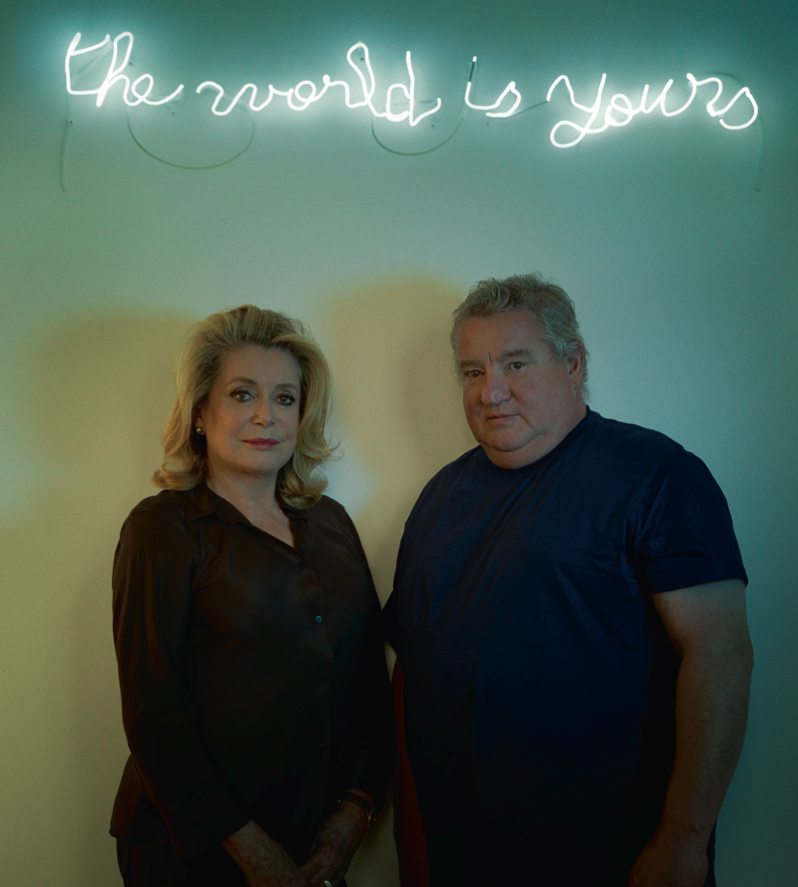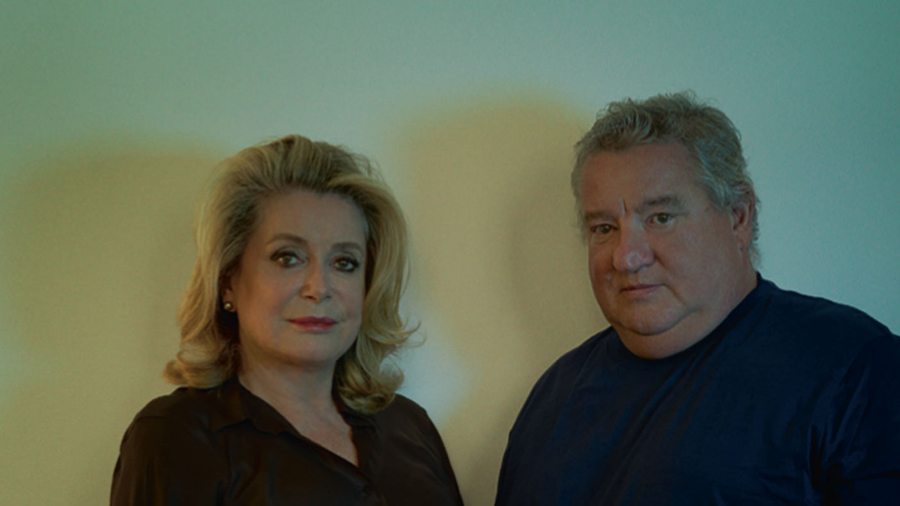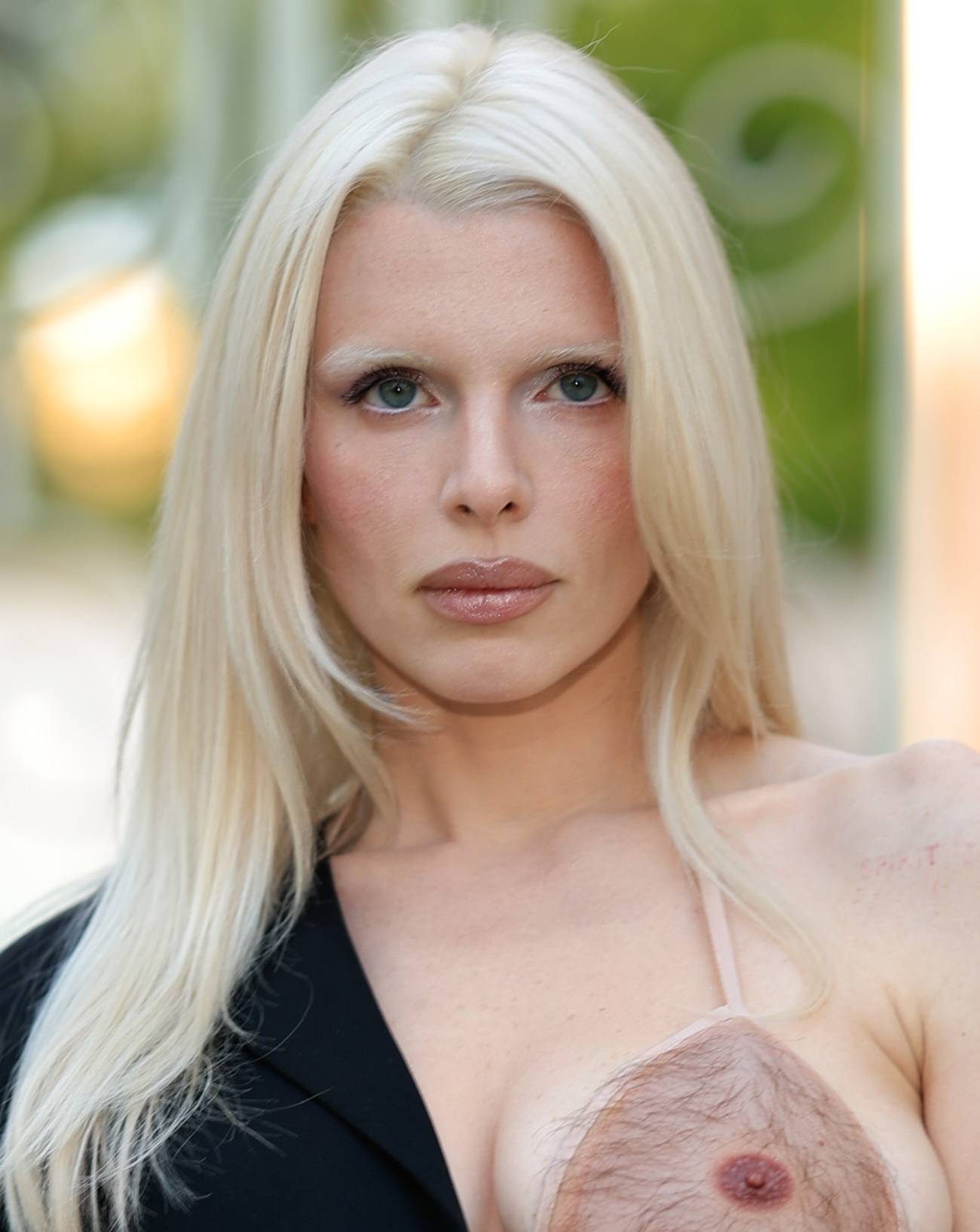

Numéro: I believe you already know each other. How did you first meet?
Catherine Deneuve: To talk gardening!
Claude Lévêque: We met several times, and I ended up invited Catherine to Nevers to show her where I grew up. At the time I was writing a book about my family and my childhood up to adolescence.
Catherine Deneuve: We saw these amazing little vegetable patches. I remember them very well.
Claude Lévêque: Yes by the main road, near where I was born. A place I’m very attached to. We spent the day together. An expedition! [laughs] We went to my grandfather’s old house, he’d been part of the Resistance. I think I told you some of my history. And then we soon started talking plants.
Catherine Deneuve : When I look at nature I almost start to believe in God. They are perfection. I have rarely seen any imperfect creation in nature. Even the plants that develop wart-like growths are still very beautiful. A plant is always beautiful. There are some I like less than others. But nothing is ugly. The plant is perfection. Nature is the opposite to human beings. The older it gets the more beautiful it becomes.
Do you have a country house like Claude Lévêque?
Catherine Deneuve : I live in Paris but I go to my country house very often, it’s on the banks of the Eure River. Since my childhood the countryside has always been for me this mix of plants and water because my parents had this old barn on the banks of the Seine. The light is so different when there is water nearby…
Claude Lévêque : It is magical. I know that too with the Loire that passes just three kilometres away from my place. A wild Loire, with lots of islands…
Catherine Deneuve : The Eure isn’t wild but it is private. That involves various commitments like taking care of the banks. And you cannot imagine what damages them, oh la la, the animals!
“When I look at nature I almost start to believe in God. A plant is always beautiful.. The plant is perfection. Nature is the opposite to human beings. The older it gets the more beautiful it becomes.” Catherine Deneuve
Claude Lévêque : Ah! The beavers! [Laughs.]
Catherine Deneuve : And the coypus! The coypus are dreadful! But then there’s the fish, the birds and at night the frogs. The noise never stops.
Claude Lévêque : At my place it’s more forest noises. Owls, woodpeckers, deer, wild boar… I love going into the forest in the dead of night. It’s truly tumultuous, almost scary. But such a pleasure, a fracas!
Catherine Deneuve : I have a couple of deer at mine. They come and drink from the pond. They had babies last year. It was very sweet. I put out a big block of salt for them in the winter. But they do cause a lot of damage. You have to remember to protect what you’ve planted… But for the moment I am enjoying the summer. A season of contemplation. The roses, the rosebushes are just glorious! And the tomatoes! It’s so much work every year that I always say I’m going to stop. But I just can’t. Some varieties are so extraordinary. I could eat them every day. And tomatoes are pretty easy to prepare, especially when they’re good.
Claude Lévêque : A splash of vinegar, a bit of salt...
Catherine Deneuve : I never put vinegar with tomatoes! It destroys the flavour. I do them Italian style, with mozzarella, a drizzle of olive oil, a clove of garlic cut in two, pepper, Espelette pepper and some basil. Cut with scissors! Never using a machine!
Claude Lévêque : I like to eat them sometimes just with salt...
Catherine Deneuve : Oh yes! When they’re good...
Are you just as sensitive to smells?
Catherine Deneuve : Even though I am a heavy smoker, I have an excellent nose. I have a very distinct memory from when I was young of a particular odour, a mix of carnations and asphalt. It must have been a disinfectant.
Claude Lévêque : I remember that too, a sort of scrap metal smell…
Catherine Deneuve : Exactly. There’s a Mediterranean plant that makes me think of that too, the Helichrysum. A smell of sand and fire. Like the Corsican maquis. Ah! Plants, they take us travelling so far. I remember buying this fascinating little book that is very precise about plants in cities. I was fascinated by these plants that grow in a cm wide crack in the concrete. Yesterday I was at the station. I was going back to Pars and I stopped in Rennes to smoke a cigarette. I was so delighted to see growing there between the wood on the tracks in the midst of the big stones opposite the platform, a magnificent silver-coloured plant. In Paris I spend my life looking at such phenomena, that power of plants to appear everywhere. I cannot help myself from picking them. Although yesterday I was worried I might get told off for walking on the rails.
Claude Lévêque : That makes me think of an olfactive experience I did for the first ever Nuit Blanche in Paris. I’d discovered this abandoned space, unknown by anyone. I worked with a very important nose to recreate the odour of that place: the grease, the rust but also the urine because it was more or less being squatted in. For the visitor the experience involved crossing a space in darkness with only this intoxicating and hypnotic scent as a reference point. The staging of my work is a vital aspect. Creating an atmosphere, thinking about the visitor’s path. The question of scale, the height of things and their position conditions the spectator’s journey and reception. Sometimes I think maybe I should have made movies! (Laughs)
“It’s the ambiguity of sense that draws us to something. Behind the magical aspect of my neons, something else gets revealed; the sentence I write with the light brings about a sort of anxiety.” Claude Lévêque
One of your neons quotes a Nina Simone song, Tomorrow Is My Turn. Both of you are passionate about music.
Catherine Deneuve : Ah! Tomorrow is my turn... [she sings it]. Nina Simone is a singer I will love all my life. Well for what I have left of it! [Bursts into laughter] I went to see her… Not the friendliest of ladies. But boy what a voice! I found the same emotion with Amy Winehouse. In Cannes we saw the documentary about her, and I became so aware of the sadness and power in her words. Up until then I’d been touched mainly by her voice.
Claude Lévêque : I’m well known for my love of hard rock music. I like music that clears my head, like with gardening. It gives me energy. But that’s not all I like, I love classical music too and have a huge passion for French variety, Claude François, Trenet...I’m listening to a lot of Trenet at the moment.
Catherine Deneuve : Ah I should have brought you Benjamin Biolay’s album of covers that’s just come out! You’d love it…
Claude Lévêque : It’s not easy to sing Trenet... It’s probably just nostalgia but I love Sylvie Vartan too. Her dramatic side...
Catherine Deneuve : She has a very dramatic voice, it’s true. A very deep voice. I love the songs by Françoise Hardy. She has a great voice. Well when she sings, not when she talks.
Claude Lévêque : Obviously! [Laughs.]
Catherine Deneuve : I still remember very clearly a scene with François Truffaut. We were supposed to be filming in a cellar where I’d find my husband again. François asked me, for staging reasons, to walk across the cellar and turn back to him. At the time this move struck me as completely meaningless. I told him so. I answered me in a pretty stern way: “Maybe, but it’s a move that I myself need. If I needed to do normal things, I’d use normal people, not professional actors.” I have to say that this comment served me a great deal ever since. I understood that to move before a camera wasn’t the same thing as moving in front of a person. The camera necessitated a staging that I had to adapt to. In that sense I’m an actress who likes to be directed.
What do you think of Claude Lévêque’s work?
Catherine Deneuve : His unusual and poetic approach instantly caught my attention. One thing I find particularly special in your works is their way of immediately attracting the eye. Then you discover a more complex back story. I’m drawn to things that aren’t always what they might appear to be. Or that could evolve towards a mystery or a secret. That’s the case with your works. I love secrets. And I respect them too. I don’t even particularly want them revealed.
Claude Lévêque : Yes the hidden part. I like that a lot too. It’s the ambiguity of sense that draws us to something. Of course when I work with light, like with my neons, there’s a magical aspect. And something else gets revealed, the sentence I write with the light brings about a sort of anxiety.
MORE: An encounter with Hanni El Khatib, the wild beast of Californian rock
WE RECOMMEND: “Disobedient Bodies”, J. W. Anderson’s big show








